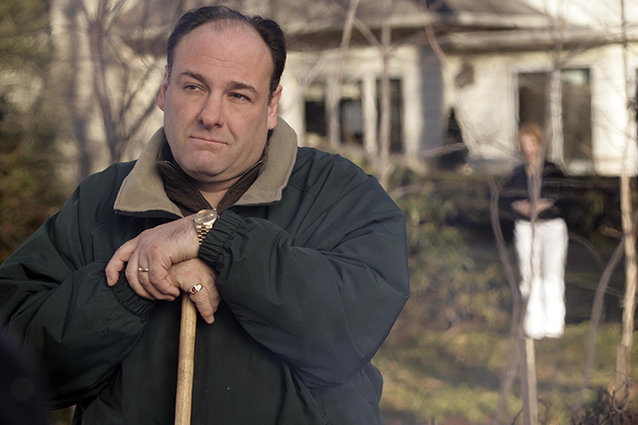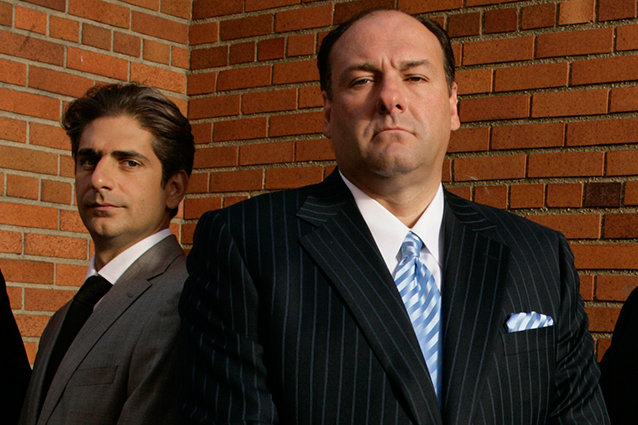
HBO
The Sopranos is praised — and rightly so — for
being revolutionary, for being unlike anything that had come before it.
It shattered all expectations of what was possible on television and
cemented the idea of an antihero for the viewing public. Without Tony
Soprano, critics and audiences alike concede, we wouldn't have the likes
of Walter White, Don Draper, Dexter Morgan, Stringer Bell, and so many
others today. But adulations of James Gandolfini and David Chase's seminal work usually fail to mention that the series is also unlike anything that has been created since.
The Sopranos was on the air from 1999-2007 —
during which time I graduated middle school, then high school, and then
headed off to college (taking me the closest I had ever been to New
Jersey). The timing was such that many of my peers were able to grow up
with the Soprano family — we were nearly the same age as A.J. My
boyfriend, who was raised in New Jersey, would watch the series with his
parents — his mom covering his eyes during scenes that took place at
the Bing — and as a result, feels the Sopranos to be a second, more
violent, deeply twisted family. I, however, came late to the game.
Tony, Carmela, Christopher, Sil, and the rest of the gang
entered my life just last year, when I finally embarked upon the
monumental journey that is watching The Sopranos. I had somehow
managed to avoid learning anything about the series while it was on the
air and in the myriad discussions that followed, barring that it was
about a New Jersey mob family and ended in a controversial cut to black.
I came to the series unspoiled, just a bit late.
While I knew nothing of the show's plot or characters
(minus, of course, Gandolfini as the family's patriarch), I wasn't blind
to the show's reputation or legacy — in my industry, with my friends,
how could I be? I was aware of The Sopranos' accolades as well
as the discussion surrounding its historical place in television, and as
such I was eager to sink my teeth into the series that paved the way
for my current favorites, such as Mad Men and Breaking Bad. Needless to say, my expectations were high. But, in large part due to Gandolfini, the series easily surpassed all of them.

HBO
A year after I popped in that first DVD, I had cried,
laughed, and gasped my way through all six seasons. And, once Journey
cut off mid chorus, I wanted to talk about what I had seen. But the
conversation I was eager to join was not the one that looked at The Sopranos in
a greater, historical context. It was not the one that thanked David
Chase for creating the bravest character on television and Gandolfini
for bringing him to life. I wanted to talk about the specifics of the
show: the scenes that left me in tears and that took my breath away, the
shocks and twists and heartbreaking moments I had just seen. And I
wanted to talk about it with fellow devotees on Twitter and in line at
Starbucks, like rabid fans of Game of Thrones are able to do every Monday morning.
Because, 14 years after the pilot aired and six years after the series went off the air, The Sopranos
still offers things I've never seen on TV before. It hasn't become
dated or passé, its disciples haven't eradicated its originality in
their emulation of its tropes. It is still the best television show I've
ever seen. And I'm not sure James Gandolfini's performance will ever be
topped.
When news of Gandolfini's passing reached me Wednesday
evening, I was affected in a way no celebrity death has affected me
before. I felt — and continue to feel — a loss for not only a great man
and a talented actor, but for someone I have welcomed into my home (by
way of the television screen) and who has become my friend. And a new
friend, at that. Tony Soprano and I don't go way back; I've only
recently made his acquaintance. But I envisioned a long and happy fandom
for Mr. Gandolfini all the same — one in which I flock to his films,
root for his pilots, and proclaim the virtues of The Sopranos for
years to come. But on Wednesday night, in a hotel room in Italy, he was
taken from me to early. From all of us. And we are all left pondering
what could have been. What happened after Tony Soprano's final scene cut
to black? We'll debate the question for decades.
No comments:
Post a Comment